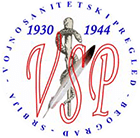Issue: Vojnosanit Pregl 2020; Vol.77 (No. 5)
Social support in recovery former users of psychoactive substances in Montenegro: A survey study
Authors:
Ena Grbović, Boban Mugoša
Background/Aim. Social support can be a very powerful and beneficial force in the recovery process. Research of social support as an important component in the process of resocialization of former users of psychoactive substances, so far, has been neglected in Montenegro. However, one of the conditions for quality analysis whose outcome would involve examining of deeper causal relationships is examining of social support structure of the respondents. That is why the main goal of this study was to determine precisely dimension of social support, and its factorability. A special sub-aim was to identify latent structure of emotional support as specific dimension within the social support scale. Methods. The survey was conducted with 107 clients treated in the Public Institution for Accommodation, Rehabilitation and Resocialization of Users of Psychoactive Substances in Podgorica (Montenegro) from May 2014 to October 2016. The Multidimensional Social Support Scale (MSPSS) was used. It consists of 12 variables that measure three components of support: Family, Friends and Significant Others. The analysis of the main components with direct oblimin rotation was used to examine the factorability of the MSPSS. After factor analysis conducted, the reliability of the determined scale was tested by Cronbach alpha coefficient through discriminatory validity. Results. All three components showed statistically significant results (p < 0.05). The coefficient of correlation between Friends and Significant Other was 0.510, while between Significant Others and Family it scored 0.617. On the other hand, the coefficient of correlation between Significant Other and Family was 0.525. As we had assumed and as previous results in this area suggested there was a significant link between the Friends and Family components. Also, 85.1% of the respondents stated that social support is important (or extremely important) in the process of rehabilitation and resocialization. Conclusion. Survey emphasizes the important role of the family in the life of respondents. Social support has many benefits and it is often crucial to establishing successful recovery of former users of psychoactive substances.

